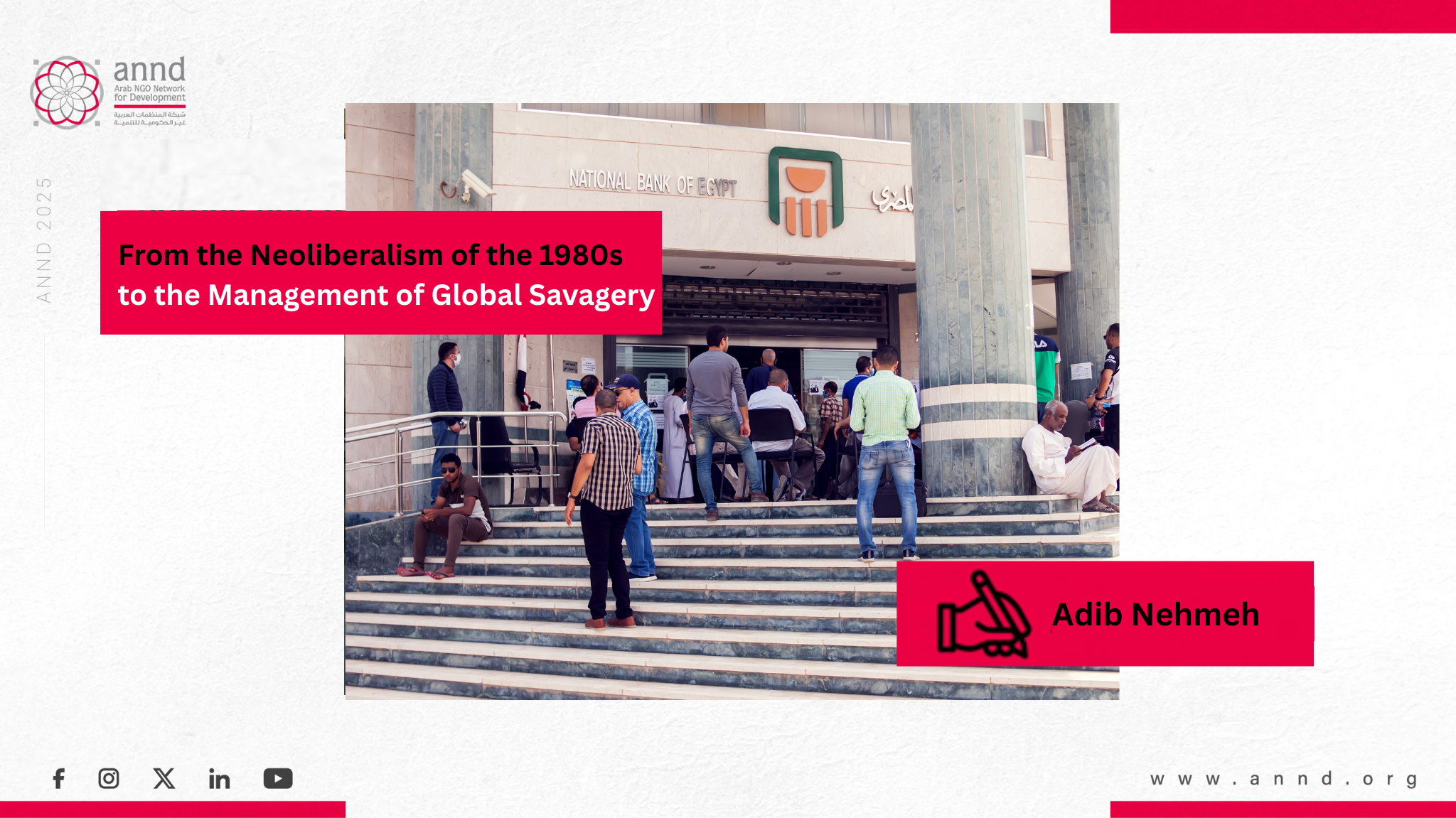
From the Neoliberalism of the 1980s to the Management of Global Savagery - Adib Nehme
Adib Nehmeh

From the Neoliberalism of the 1980s to the Management of Global Savagery - Adib Nehme
Two Perspectives
No one can deny that our current world is in unprecedented crisis. The collapse of the bipolar system was followed by a series of crises at the centers of the global system, most notably the 2007/2008 crisis and the subsequent crises and wars. Today, we are facing a complex, comprehensive crisis summarized by the conceptual tools of the mainstream in the currently used term "polycrisis." A more understandable translation of this term is that we are dealing with a "crisis within crises" and "crises within a crisis." However, this interpretation goes beyond the meaning intended by the mainstream, which reduces it to a "multiplicity of crises," with interconnected links and mechanisms for the transmission of impact from one crisis to another. We believe that the latter is a deliberate simplistic perception, intended to avoid acknowledging that the source of these crises is essentially the same: the neoliberal globalization system that has prevailed since the 1980s, its transformations, and the mainstream's attempts to transcend it while preserving their interests.
The neoliberal globalization model that has prevailed since the early 1980s has reached its historical limit, and the current historical task lies in transcending this system itself and defining the nature of the alternative model. Peoples, change movements, and civil society organizations have struggled and waged difficult and harsh confrontations against the neoliberal globalization model that has prevailed over the past four decades, contributing to its weakening and deepening crisis. However, other parties have contributed to its internal dismantling by its creators and beneficiaries. The conflict today has shifted to a struggle over the alternative model, which will likely be more violent, as the facts of its current formative stage indicate.
Liberating Global Savagery
The globalization champions, having dismantled the neoliberal model of the 1980s, are currently seeking to replace it with a more brutal system at the economic, social, environmental, political, and cultural levels. This is in pursuit of a complete break from all forms of restrictions and controls on freedom of movement, action, and exploitation. Using the terminology and tools of the "Washington Consensus" and "structural adjustment" eras, what is currently taking place represents a push to deregulate to its maximum extent, including the suspension and subsequent dismantling of the entire global governance system, including the United Nations system in particular and the human rights system. This is because the international balance that led to its formation after World War II has ended.
In their view, the world today must become a unipolar world, led by the strongest pole of the global far-right and populism, represented by the United States under the current term of President Trump. This world relies directly on military force, effectively used to impose control over the course of global political-economic development, and by extension, domestically. As for other countries, including those of the North before the South, most of them are transforming into states supporting renewed nationalism and colonialism in their new war to control the world, its resources, and its peoples, to overturn the results of the post-World War II balance of power, and in the raging trade and economic war against what have been considered in recent years in globalization literature to be global economic poles that herald the possibility of a multipolar world.
The counterattack launched by this right began in the early 1980s, and even before that, with the abolition of the gold standard for currency pricing and the dollar convertible to gold by President Nixon in 1971. At the time, this represented an unprecedented act of piracy and an undermining of one of the most important pillars of the Bretton Woods system. However, the current piracy led by the United States under President Trump is a comprehensive piracy that extends beyond the economic sphere, encompassing virtually everything from the economy, finance, and trade, to the environment, society, politics, war and peace, to the human rights system and the entire value system, including the substitution of culture for triviality and for rights and justice for mere profit.
If this piracy succeeds, this complete undermining of international law and the elimination of the minimum margin of relative mutual independence of the social, political, cultural, and political levels in their relationship with each other will consolidate a process of forced subjugation of all spheres of life, the planet, and its people and resources by force, to a policy expressed in practices and an extremist utilitarian ideology, led by a nationalist tendency in its central American pole, joined by the giants of finance, technology, military industries, energy, and the most brutal extractive industries that devour the land and people, seeking a competitive, monopolistic division of rare minerals and precious resources contaminated by the blood of people and peoples, especially in developing countries, or countries that are being weakened and plundered, from Africa to Asia... all the way to Ukraine and Greenland.
The Struggle for the Alternative
The current confrontation is not between a developmental-rights perspective and the same neoliberal globalization model we have known since the early 1980s. This model of globalization was abandoned by its proponents and destroyed by themselves. In this sense, the current confrontation is a confrontation between those who hold the right to development and self-determination, and those who seek to enforce human and peoples' rights, and achieve development and social justice in their homelands and globally, on the one hand; and a current and future model of a brutal global order in the making, which subjugates the economic to the political and to the traditional colonial ideology, renewed in an extreme and coercive manner, as was the case in previous historical eras.
Militarism and Political/Ideological Tyranny
The model we are currently experiencing organically integrates politics and ideology with economics, and openly relies on coercion, violence, and war as a means to achieve its goals. In this model, the priority of the public interests of global capitalism, with all its components, recedes in favor of the interests of capitalism in its central pole, represented by the countries of the North during previous decades, and then subjugates all to the interests of a single governmental/national pole, supported by giant cosmopolitan corporations and the global far right. This transformation is taking place at the expense of the peoples of these countries themselves, and at the expense of other countries, particularly those of the South, but also at the expense of the countries of the North, and those considered emerging economies in the literature of the last two decades. Today, we are facing an attempt to impose a path for the complete elimination of the various components of the international order that emerged after World War II, leading to the liquidation of the United Nations system, the dismantling of the human rights system, international law, the rules of diplomatic relations, the global economic system, and the system of values associated with it, as expressed in the UN Charter, among other documents and agreements. This is an attempt to return to something resembling the situation prevalent before World War I, including the dream/nightmare of a situation that would enable the most powerful force in the global system (the United States of America) to become an empire on which the sun never sets, ruling the world, as the Great British Empire did in the classic colonial era.
Resistance to this path remains below the desired level, and the responses of the parties involved—both in the South and the North—are governed by positions ranging from explicit or implicit support, hesitation, temptation, or fear. Each of these positions could obstruct the process of confrontation and push toward a fatalistic or wait-and-see stance, with some protesting consciences that fail to translate into effective action of protest and resistance.
Unfortunately, there is no doubt that our region, our countries, and our societies are the regions of the world where this destructive conflict, which expresses the violent birth pangs of this new paradigm, is most evident. It is the region where the most extreme means of crystallizing the new model of globalization based on brutal unipolar hegemony are being tested. It may be its preferred birthplace and the gateway to dragging allies and partners into subscribing to this model.
If this is what we must confront, can we do so with the same theoretical tools and combative strategies?
Recent publications

